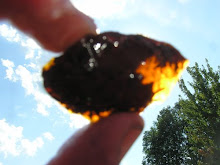
I won't kill them.
Because tomato hornworms become 5 inch wide hawkmoths like this one:

Manduca quinquemaculata
I also now know that the caterpillar overwinters as a pupa in the soil, emerges as the moth in the late spring, mates and lays eggs, which become tomato hornworm caterpillars. They have two generations per summer. The moths are nocturnal.










5 comments:
I will.
I did!!! They were eating my tomato plants and I worked too hard to get my garden going this year. And if I find anymore they too will take a soapy water bath!!!
Yeah, sorry, count me in the Death To Tomatoworms column too. First year I gardened I actually tried to be all Buddhist about it. Left one plant go as a sacrificial victim, and plucked the green monsters off the others and carried them over to it.
It was stripped and naked and dead within a week, and the worms kept coming on the plants I was counting on for, like, food. After that it was pluck 'n' stomp. The next year...Sevin.
although I did finally pick up the tip to plant basil like crazy all around the tomatoes. This does seem to work to a remarkable extent. And the weirdest thing is, despite all the worms? I have never seen a hawkmoth here. Many, many others, up to and including lunas, but never a hawk. Go figure.
Blech. I just found these for the first time, in my first real garden. The caterpillars were about 6 inches long and disgusting. My son pulled off every single one he could find and dropped them in hot soapy water. I don't want to lose tomatoes to these critters. They gave me the SHIVERS!
One day my Jalapeno plants were full of leaves, the next it was stripped naked. They even started eating the Japalenos as well. There were five on one plant. I cut the branches off and put them in jars. Want to see them turn into moths. Need to find more food for them though. May go buy some sacraficial tomato plants to feed them until they spin their cocoon. But if it takes a while, they may just end up as fish food in the lake. I don't want to be spending a lot of money on sacraficial plants, even in the name of science.
Post a Comment